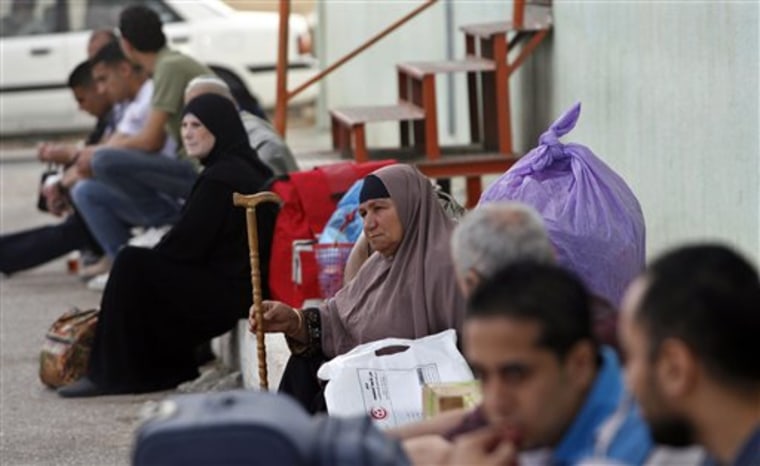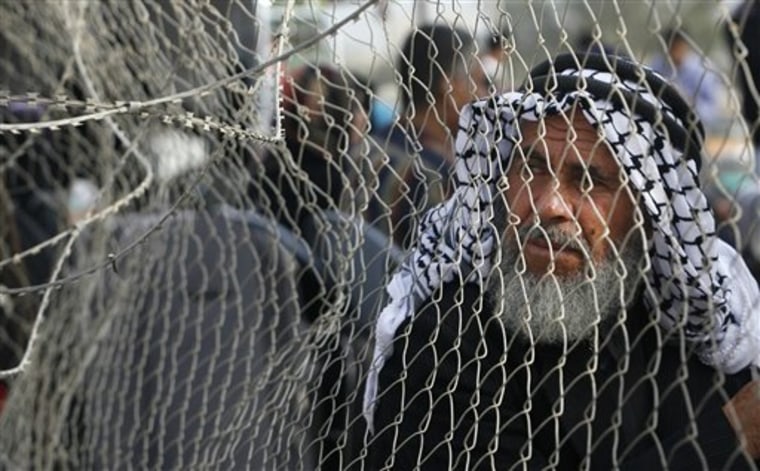The opening of the Gaza Strip's main gateway to outside world this weekend provides a long-awaited relief for its population and hands the Palestinian territory's Hamas rulers a significant achievement. But it highlights the deterioration in Egypt's relations with Israel since protesters forced Hosni Mubarak from office in February.
Egypt's plans to open the Rafah crossing on its border with Gaza on Saturday have raised Israeli worries that Hamas militants will be able to move more freely in and out of the long blockaded territory.
The decision by Egypt, announced soon after Mubarak fell and the military took power, was a dramatic reversal. Mubarak, who like Israel considered the Iran-backed Islamic militants of Hamas to be a threat, had cooperated with Israel in imposing a blockade on Gaza that greatly restricted movement. But the help in a closure that wrecked Gaza's economy and deeply hampered the lives of its 1.5 million Palestinians brought Mubarak heavy criticism from Egyptians and from many in the Arab world.
The blockade, meant to weaken Hamas and prevent the movement of militants and weapons across the border, has allowed only a trickle of Gazans to leave the densely populated coastal strip.
Egypt gave Gazans permission to cross only under particular conditions, such as students, business and people in need of medical care, and even they had to wait weeks or even months for the Egyptian permits. The crossing was frequently closed completely for periods. Gaza's other border is with Israel, and people are allowed to cross only in rare cases.
In recent months, Egypt has allowed some 300 Gazans to enter Egypt each day, far short of the number of people who want to travel. With Saturday's opening, there will be no official limit on the number who can leave Gaza, though Gaza officials say Egypt has told them that the crossing will likely be able to handle about 1,000 travelers a day. Still, that number would ease the huge backlog of people waiting to go.
"I hope that this news will lead to some change in our ability to travel freely," said Saadi Samir, a 33-year-old businessman who said he has been waiting for five weeks to get a permit to travel through Egypt to Dubai. "The new arrangement on the border is a good step, but we still need to see more. All we are looking for is free movement like anyone else in this world."
The new system will not resolve Gazans' travel woes completely.
Border pressures
Women and males younger than 18 or older than 40 will still have to register for Egyptian permits to leave, but the permits won't be restricted to certain classes of people and the process for issuing them will be much faster than in the past. However, men between 18 and 40 must now obtain an Egyptian visa, which make take weeks.
It also will not ease the other pressures of the embargo. Rafah is a passenger terminal, and Israel controls Gaza's cargo crossings. While Israel allows most consumer goods into Gaza, it still restricts exports as well as the entry of badly needed construction materials, saying they could be used by militants. Israel also enforces a naval blockade aimed at weapons smuggling.
Omar Shabban, a Gaza economist, said a bustling border crossing would nonetheless give an important boost to the area's economy, since it would allow thousands of Gazans living abroad to return home for summer vacations. "This will inject a lot of money into the tourism and transportation and other business sectors," he said.
In the wake of Egypt's announcement on the crossing, Israeli and American officials have expressed concerns that Hamas will exploit the opening to bring weapons and fighters into Gaza.

Egyptian officials say they have security measures in place to ensure people don't carry weapons through the Rafah crossing. All baggage is put through X-ray machines, and all those entering and exiting are put through personal searches, a procedure which imposes practical limits on the number who can cross each day depending on the number of Egyptian security personnel.
In any case, the crossing itself is not needed to get weapons into the territory. Throughout the blockade, enterprising smugglers have long moved weapons, consumer goods and people in and out of Gaza through a network of tunnels along the border. Gaza militants now have military-grade rockets that can — and have — hit cities in southern Israel.
Israeli defense officials say Egypt's anti-smuggling efforts have all but ended in the chaos following Mubarak's ouster.
Amos Gilad, a senior Israeli Defense Ministry official, said Friday that Israel was waiting to see to what extent the Egyptians would allow free movement. Israel's primary concern, he told Channel 2 TV, is that military training personnel could cross to instruct Hamas fighters.
"One trainer who tells them how to set up the rockets and how to use them is equal to a large quantity of weapons," Gilad said.
He said Israel's ties with Egypt's interim leadership were "stable and trusting, including in talks on issues like the border crossing."
The White House said Thursday that the U.S. has questions about how Egypt will ensure that weapons don't enter Gaza. Ben Rhodes, an aide to President Barack Obama, said U.S. officials had asked Egypt for clarification.
'Empowering Gaza'
Egypt's decision reflects a change in its attitude toward Israel since Mubarak's downfall. At least outwardly, the military council running the country until parliamentary and presidential elections later this year has shown more interest in warming ties with the Palestinians than with maintaining the Mubarak-era close adherence to Israel, with whom Egypt shares a three-decade-old peace agreement.
Last month, the Egyptian regime successfully brokered a reconciliation between Hamas and rival Fatah, which runs the West Bank government. The two had been sharply at odds since 2006, and Hamas defeated Fatah's forces in Gaza in a spurt of fighting in 2007, and years of mediation by Mubarak's regime had failed to bring results.
With details of the reconciliation still being worked out, Hamas will be in charge of the Palestinian side of the Rafah crossing. Nonetheless, Fatah official Nabil Shaath praised the move as an important step for Palestinian unity.
"This is a very great decision for all of our people in Gaza," he said. "The issue is no longer empowering Fatah or Hamas. The issue is empowering Gaza. We want people to go out of this jail."
